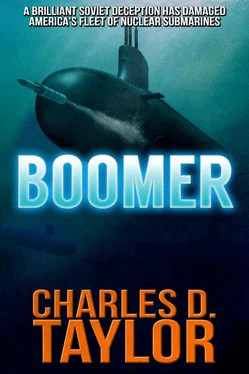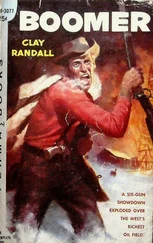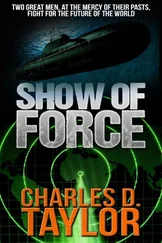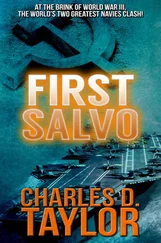* * *
“I suppose I have to talk to him.…” The grin on Admiral Larsen’s face at the start of that sentence was meant to express his lack of enthusiasm for the President, but it faded just as quickly. “Don’t I?” he concluded, realizing that he, in fact, was overwhelmingly sympathetic to the man at that very moment. “Put him through on the secure line,” the CNO requested.
There was no response from the others. They understood why Ray Larsen had begun that way and why he acknowledged his relationship with the President just as quickly. The man in Washington had not been kind to Larsen the past two years, not when it came to budgets. He said that the Navy was pretty well-heeled from previous administrations and it was his job to make sure the other services got a fair shake. While Larsen could admit privately that possibly his commander-in-chief might have a valid argument from the taxpayer’s point of view, publicly the two men remained in opposition to each other. Unlike a politician, Ray Larsen also possessed an inherent respect for the office and its responsibilities, regardless of its inhabitant.
“This is Admiral Larsen, sir. This line is secure.”
Bennett, Arrow, and Newman quietly studied the change of expressions on Ray Larsen’s face as he talked with the President. There was no speaker phone; a secure line would automatically cut out the feedback. Listening to a one-way conversation is much like eavesdropping, though there is no guilt since only one individual is under direct observation.
“Our conclusion could as easily be based on our combined experience. But to reinforce that, it appears statistically almost impossible that two of our boomers could be lost as the result of an engineering casualty in this manner.”
Eyebrows raised in frustration.
“I fully agree that anything’s possible, sir. However, the number of reasons one would disappear without our having some prior knowledge of a problem, either through an analysts of earlier engineering casualty reports or an unanticipated emergency, is almost zero. It would almost have to be human error. But two of them like this — no chance, in our opinion.”
A nod as his explanation was acknowledged.
“Yes, sir. Admiral Bennett, OP-02; Admiral Arrow, Pacific Submarine Force Commander, and Admiral Newman, Director of Naval Nuclear Propulsion.
A slight smile.
“I’d have to agree with you. If they can’t figure it out, then no one can,” he added for their benefit.
Knit eyebrows — a question he hadn’t expected.
“Beyond the Russians, only the French and British have that sort of capability, and I can’t imagine a scenario that would cause them to do it. They have nothing to gain, sir, nothing I could possibly imagine in my wildest dreams. On the other hand, the Soviet Union has a thousand and one ways to benefit.”
Larsen shook his head.
“Well, sir, you are privy to much more intelligence, but my personal knowledge of their naval leaders would still negate even that. Sort of like cutting their own throats, you might say. And I think the fact that they have no SSN’s anywhere in that vicinity or even close enough to have an impact should knock them off the list.”
Ray Larsen was jabbing his finger at a point well to the left of Robbie Newman, as if the President were actually in the room. Bennett found Larsen’s habit even more disconcerting when he was gesticulating into blank space.
“That’s right, sir. To be absolutely honest, Admiral Arrow’s people have been using their computers to project possibilities based on last known position and possible tracks … and they’ve come up with nothing yet. I wish I could offer some hard facts, anything other than my personal suspicions. It’s just that I’ve been in this business for — “
The CNO wasn’t used to being interrupted, and there was a surprised look on his face.
“Thank you, sir. I realize we’ve had our differences and I appreciate your confidence.”
Larsen listened and stroked his chin thoughtfully, occasionally glancing across his desk at the others. Then he shook his head forcefully.
“Damn. I can’t believe it. No indication whatsoever. That was going to be my next question, sir. I thought sure our intelligence people would come up with some hint.”
He leaned forward, cocking his head slightly to one side.
“Yes, sir, I’m sure of that. If there’s anything at all, you can be certain I’ll be in touch immediately.”
When he replaced the receiver, Ray Larsen chewed on his upper lip before he spoke. “Can you believe there’s no sign at all in Moscow that anything’s up? Not a whisper.” He exhaled slowly. “Our commander-in-chief expressed the desire that we come up with something plausible pretty quickly. He said that when there’s no light at the end of the tunnel, then you go to the next tunnel. We’ll set the Russian theory aside if we don’t come up with something damn soon.”
“Where else would we look?” Robbie Newman inquired calmly. “Every single engineering report since Nevada and Alaska began construction has been sifted through our computers. I couldn’t put my finger on anything unless I found the wreckage.”
“He doesn’t understand that,” Larsen responded irritably. “You see, he understands that there are hundreds of Alaska and Nevada survivors out there who have no idea their men are gone. Each hour we wait makes it all that much uglier … for him … for all of us.…”
Mark Bennett tried to imagine how Judy would have reacted if old Stonewall had gone down, especially if the information had been withheld from her. In those days, the kids were still around home. The loss would have been blown out of proportion. But that was years ago. Now they were on their own and Judy — well … he wasn’t sure how she’d handle it. He knew damn well how he’d feel if be were in her shoes and it was Judy who was lost at sea.… That was it. Now he knew.
“We’ve got to go to the families soon,” Bennett said. “They deserve it. I think we’ve got to make plans to have someone knocking at each door, and I think we’ll have to isolate Bangor for as long as possible. You know what I’m thinking about here — the-Navy-takes-care-of-its-own approach, so the media doesn’t get wind of it right away. Maybe by the time they do, we’ll have something to go on.”
Neil Arrow didn’t like the idea. On the other hand, he had to admit that eventually there’d be no other choice. “Okay.”
* * *
Markov grasped the arms of his captain’s chair as SSV-516 slid down the side of a huge swell and heeled heavily to port. A screaming wind tore the foam from the tips of waves as high as the bridge and swirled it in a gray mist that enveloped them. The ship hung for an instant, the inclinometer passing thirty-five degrees before beginning the long swing over in the other direction. This was a better course for the safety of the vessel, because they were keeping the sea on the starboard bow rather than burying the ship’s nose deep into each immense wave. It was easier on SSV-516, harder on her crew. Sleep had become just about impossible. Eating was for a select few.
The phone on the bulkhead buzzed. Markov’s grip on the chair tightened with one hand as he grabbed the instrument with the other. “Captain here,” he growled.
“The American aircraft is closing, sir. Now on a direct course.”
“When did it turn?”
“As soon as the last signal to the American submarine.”
“Range?”
“About seventy kilometers.”
“Call me if there is any change in the American’s direction.”
Captain Markov hesitated. There was no way that aircraft could get a visual on them in this dismal weather. But, he eventually reasoned, it was all a matter of electronics these days, so seeing your enemy no longer had meaning. He pushed the button for his warrant-missile specialist. “Our target is closing now. If he reaches forty kilometers, I want you prepared to launch on my direction. Is your kill range limited that much in this weather?”
Читать дальше












